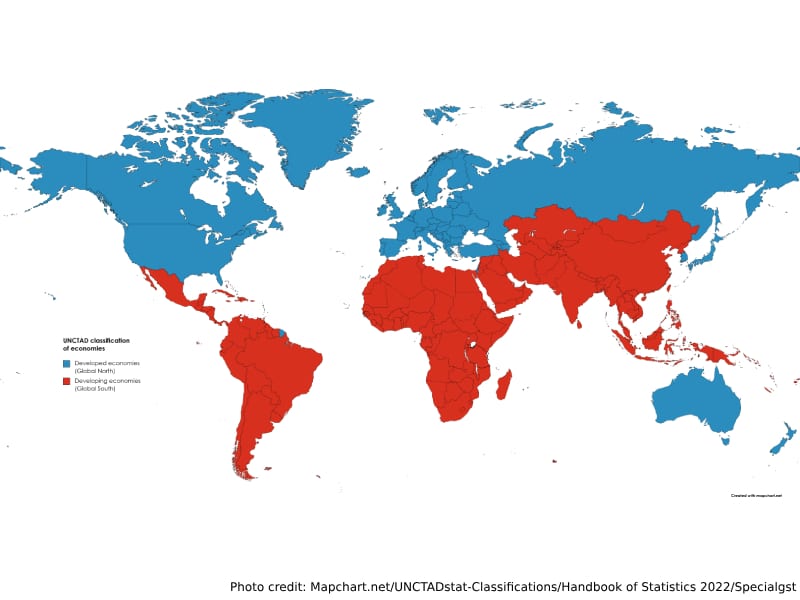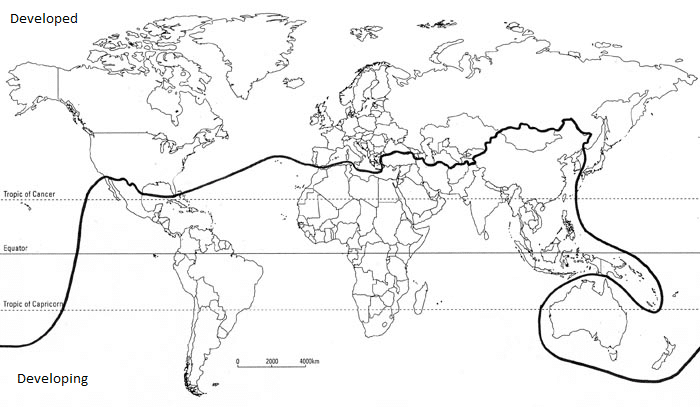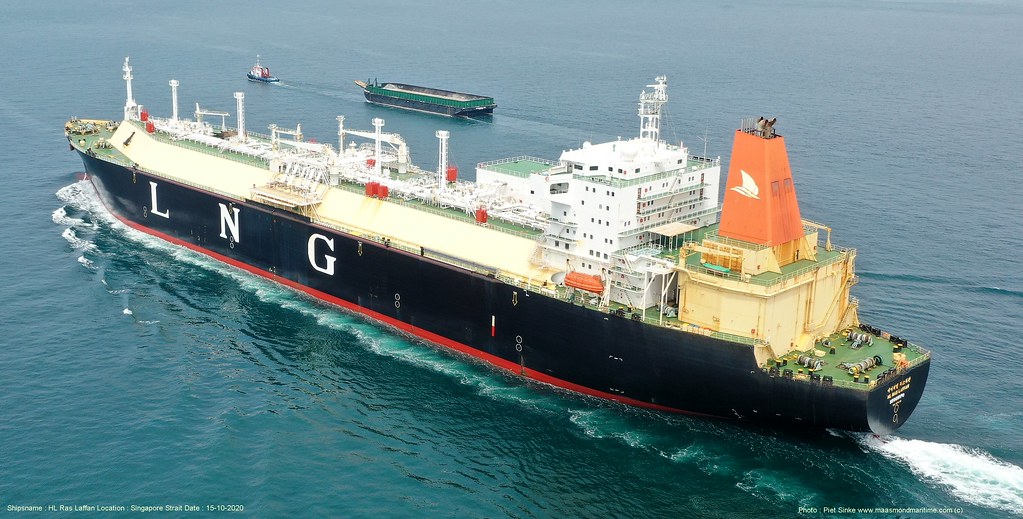
This article will focus on the countries of the Global South, the origin of the term and how it evolved over time, and the positions of the countries of the Global South on the current issues in international affairs namely the Russo-Ukrainian war and the BRICS integration and collaboration. Also, we will discuss how Europe as a political entity needs to change its approach towards the countries of the Global South to overcome the pressures that contemporary events in the international arena bring. We will also discuss the role that some of the Middle Eastern countries play in the energy crisis and how China approaches this region. The origin of the term Global South can be attributed to Carl Ogelsby, an American writer and activist of the New Left who coined the term in 1969. While he was writing in the Catholic journal Commonwealth during the Vietnam War, he observed that "the North’s dominance over global South…has converged…to produce an intolerable social order." At that time, most Western analysts conceived the globe as broken into three worlds, as first depicted by French demographer Sauvy in 1952. These included "The First World" comprising of the United States and its Western allies; a "Second World" composed of the Soviet Union and its satellites in the Eastern Block; and a "Third World" consisting of developing and non-aligned countries.
The concept of Global South as a synonym for a Third World began to gain traction during the 1970s and 1980s which brought another segregation of the "worlds" in terms of economic development by clearly distinguishing between the countries of the northern hemisphere which had higher GDP per capita and the poorer ones, mostly located in the southern hemisphere. Most of the latter group fell south of what became known as the Brandt line (attributed to West German Chancellor Willy Brandt), an imaginary boundary running from the Rio Grande into the Gulf of Mexico, across the Atlantic Ocean, through the Mediterranean Sea, and over the vast expanses of Central Asia to the Pacific Ocean. Following the end of the Cold War, the term "Third World" fell gradually out of favor, both because the ‘Second World’ itself had ceased to exist and because it seemed pejorative, meaning a group of backward and unstable nations mired in poverty. By comparison, the Global South offered a more neutral and appealing label. As such, the term "Third World" related to the existence of the two superpowers, the U.S. and Soviet Union and it belonged to the specific geopolitical moment of the Cold War. We can see that the definition of the Global South evolved over time and was coined to fit specific moments in political history.
The Term "Global South" should be substituted with another one that is more adequate to the contemporary world and the current balance of power. The most obvious limitation of the current term lies in its conceptual incoherence. In common usage, the label amalgamates a remarkably heterogeneous group of 130-odd countries, representing perhaps two-thirds of the world’s population and spreading across vast expanses of Africa, the Middle East, Asia, Oceania, Latin America, and the Caribbean. Its members range from Barbados to Bhutan, Malawi to Malaysia, Pakistan to Peru, and Senegal to Syria. The category encompasses both major emerging powers, including aspirants to UN Security Council seats such as Brazil, India, and Nigeria, as well as small states like Benin, Fiji, and Oman. The problem with the definition of the term is that it does not take into consideration the vast and multiple cultural, economic and political diversities. With that in mind, we will use the term Global South to address the nations that broadly comprise countries in the regions of Africa, Latin America and the Caribbean, Asia (without Israel, Japan, and South Korea), and Oceania (without Australia and New Zealand), according to the United Nations Conference on Trade and Development (UNCTAD).
In recent years, especially during the Russo-Ukrainian war, there has been a shift that countries of the Global South have taken when dealing with the recent developments on the global stage. Recent years have been packed with events of the utmost importance that require all players in the wide geopolitical game to consider their own interests in the first place to respond to those events and the changes that they bring. For many decades, the countries of the Global South were neglected, and European policymakers easily dismissed their views in many cases. This trend received a new impulse after the collapse and dissolution of the Soviet Union and with the creation of the unipolar world which dictated the pace of dealing with the countries of the Global South in the euro and western-centric way. This approach meant treating the countries of the Global South as mere raw material suppliers and possible trade partners but only in a way that served the interests of the Western countries.
Amending this approach became a necessity with the rise of China and the consolidation of Russia in the first decade of the 21st century when these two countries started to question the U.S.-led hegemony in global affairs. Countries of the Global South started to establish deeper connections with each other while looking for the best way to find their place in the new era of global repositioning. The recent developments on the global stage that simply could not be tackled without the further engagement of the countries of the Global South and a more honest approach of the West towards the nonWestern world again reaffirmed the need for global collaboration among the countries of the Global South. Multipolarity is de-facto the reality and the international system has been witnessing massive change on a geopolitical level with Russia and China challenging the U.S. hegemony. As the U.S. remains the country with the largest military and soft power that can be projected across the globe, Europe remains closely aligned with the U.S. through NATO integration and this alliance was solidified with the onset of the Russian invasion of Ukraine. While keeping this alliance, Europe will also need to develop a new proactive policy towards the countries of the Global South. On the other hand, it is hard to find a ‘leader’ among the countries of the Global South as their interests often clash. BRICS is a good example of how countries can collaborate in common interests (mostly economic) while still having frictions and clashed interests in other domains (i.e. territorial dispute between China and India over two bordering provinces Aksai Chin and Arunachal Pradesh). It remains yet to be seen how the collaboration and partnership between the BRICS countries will play out on a broader scale.

Another issue that proves itself again to be a global issue that cannot be confined only to a certain part of the globe is certainly the issue of global warming and climate change. For decades, initiatives and efforts to fight climate-related problems have followed a similar path that left many of the global climate problems unresolved: Rich countries would declare the need to cut global emissions, and developing nations would point out that they needed assistance to shift toward cleaner sources of energy. Small amounts of funding would be announced, but very little of the money promised would ultimately get delivered. Year after year, the cycle continued. A glimpse of hope emerged in the Egyptian resort Sharm El Sheikh at COP 27 in November of 2022 when European countries promised an increase in funds that are aimed toward loss and damage payments. Scotland promised 5.7 million US Dollars and Austria, Belgium, Germany, and Denmark joined in with a similar sum of money relative to their side. Cooperation like this needs to be continued as research indicates that by 2030, developing countries could suffer up to 580 billion dollars in annual climate change-related damages. Similarly, the spark of a positive shift towards a better understanding of the Global South was made when the COVID-19 pandemic started. The Western countries realized how the developments in other parts of the world can quickly erupt into a global issue and evolve into something that requires full collaboration from all players in the global arena. Many European policymakers acknowledge the need for a complete paradigm shift in a way that will take into consideration the problems and interests of the countries of the Global South as well. However, this is easier said than done and the positive outcomes are yet to be seen as the EU and the West are still trapped in the post-colonial and orientalist approaches towards Africa and the Middle East. The EU has long thought of itself as a champion of multilateralism, a force for global good, and a benign international actor. Yet across EU capitals, developing countries are still largely viewed through a self-centered and mostly transactional and transatlantic lens.
It was very clear from the first moment of the Russian aggression on Ukraine that the reactions from the West and most Global South countries would be different. While the majority of Europe and the West provided support to Ukraine in its willingness to deter the Russian invasion, the vast majority of the Global South countries preferred to keep a distance and not directly align with either of the two parties involved in the conflict. Although on 2 March 2022, the Global South predominantly condemned the Russian invasion of Ukraine in the UN vote (141 out of 193 countries called on Russia to withdraw from Ukraine), they did not join the sanctions against Russia. The reaction of the countries of the Global South can be epitomized through the example of South Africa. Though South Africa condemned the Russian invasion, it withdrew its condemnation later on. This was then followed by South Africa’s abstinence from voting in the UN and was reaffirmed by Pretoria’s very general call to both sides to end the hostilities. This is the position that many of the African states took vis-à-vis the Ukraine-Russia war. They were balancing between condemning the aggression as a ‘violation of the UN charter’ and maintaining the traditional close relations with Russia. Also, South Africa is focused on enhancing the collaboration within the BRICS where its relations with China and other members of the group is critically important. This was even clearer when the UN Security Council meeting was held in February 2022. While Washington, London, and Paris called for an emergency meeting of the UN General Assembly on Ukraine, the United Arab Emirates also abstained from supporting the proposal despite its military agreements with the United States and France. The same group of countries reassured their support for the territorial integrity and sovereignty of Ukraine. The key arguments that Global South nations put forward are based on what they consider to be Western hypocrisy when dealing with international issues. The cases of the U.S.-led interventions in Iraq, Yugoslavia, Libya, and Syria and its indifference towards the conflict in Yemen and other conflicts in Africa are just some of the examples that are frequently mentioned by those nations. What makes the approach of the Global South countries to the crisis in Ukraine even more complex is the fact that 32 countries abstained from voting at the UN are the countries that make up almost half of the world’s population.
The balancing game that Asian and African countries carry out is easily understandable if we keep in mind that many of them have trade and military relations with Russia. The best example is India, which traditionally has very advanced military cooperation with Russia, and it is dependable on Russian military supplies for maintaining its army. Also, India is dependent on Russian crude oil. It applies to most of the African North and Central African countries that were traditionally using Soviet and later Russian military equipment and supplies. While the West looked very convinced that Russia would be completely isolated, the events that followed came as a surprise for the Western countries. The real question is whether this was expected or their surprise was a result of the century-long West-centered approach to the world’s problems. In the following months with China and India maintaining close ties with Russia and with China even helping Russia to evade sanctions by likely supplying navigation equipment, fighter jet parts, and other dualuse technology to the Russian side came the realization that the Global South has not been supportive of the West.
There were early indicators; however, that some of the African countries may support Ukraine, at least that was the indication that was given by Martin Kemani, Kenyan ambassador to the UN who compared the Russian invasion of Ukraine to the redrawing of borders in Africa by the colonial powers. Although this looked like support for Ukraine, the support from the African countries was yet to be seen. Additionally, even nonwestern democracies like Brazil, India, Indonesia, and South Africa refused to impose sanctions on Russia. Additionally, Brazil quickly disregarded any possibility of supplying Ukraine with German-made artillery pieces and India almost doubled its imports of Russian oil. If we keep in mind that the old Western way of dealing with the Global South is still in place these reactions shouldn’t come as a surprise. Interest, above all, is what matters in the actions that countries are undertaking in international affairs. That is something that Western countries tend to forget. The countries of the Global South have the right to pursue their interests in the same way as Western countries do.
The economic and energy interests are the main reason why Asian countries like India and China are trying to balance their approach toward recent global events. The response to the crisis created by China and India was very similar to Germany’s response at the G7 summit in Hiroshima in May 2023. While many European leaders agreed that China presents a "systemic challenge" and that a new approach towards China should be made, German chancellor Olaf Scholtz was not that fast in committing to altering course and he offered a more realistic view while emphasizing the importance of preserving commercial relations with China. He also said that "Any functional international order must reflect multi- polar character of the world". This is an indication that G7 wants to stay relevant in global affairs and is willing to engage with the Global South countries. This was further reaffirmed by Japanese Prime Minister Fumio Kishida who said that his country’s "role is to bridge the gap between G7 and the Global South in areas such as food security and energy." This comes in hand with a worldview that many countries of the Global South share and that is the need for the reforms and possibly the transformations within the global system as it was also stipulated at the BRICS Summit’s declaration in Beijing in 2022. Calls for reforms within the global system came both from G7 and Global South countries: Japan and Germany have been pushing for a reform of the Security Council. Together with Brazil and India, they have pressed for permanent seats.
The war has also produced a ‘new Eurocentrism’. Before the new phase of Russia’s war against its European neighbor, there was a growing awareness, particularly in the United States, that the center of gravity in international politics was shifting towards Asia. In that context, Europe was demoted to a ‘secondary’ status. Over the last year, however, Europe was again scaled up to the center of international politics. Once again, we assume that the rest of the world will subordinate its own needs to those of Europe. Many seem to believe that the future of this planet depends on what happens in Ukraine. The words of the Indian foreign minister Jaishankar are indicative in this regard, "Europe needs to get out of the mindset that Europe’s problems are the world problems, but the world’s problems are not Europe’s problem". Also, this comes in hand with a world view that many countries of the Global South share and that is the need for the reforms and possibly the transformations within the global system as it was stipulated at the BRICS Summit’s declaration in Beijing in 2022.

The Russo-Ukrainian war brought additional tremors in the world of energy as the main European importers of Russian crude oil and gas needed to find new suppliers. The oil and gas-rich countries of the Middle East and North Africa came as a logical solution to this problem. Strong European economies were focused on attaining alternative sources of fuel to sustain their economies after imposing the sanctions on Russia and consequently cutting themselves from importing crude oil and gas from the Russian Federation. This process did not happen overnight; EU nations gradually scaled down their dependence on the Russian Federation for crude oil and LNG. In the first instance, the new sources were found in Azerbaijan and Norway, but it was quickly realized that the quantities imported from those countries were not enough to fuel the economies of the EU countries.
The North African country Algeria came into prominence as a possible partner for exporting oil and gas to the European market, predominantly to Spain and Portugal which already had established trade agreements with Algeria. In order to substitute the Russian LNG, European nations also turned to the rich monarchies of the Persian Gulf, namely, United Arab Emirates (UAE), Saudi Arabia, and Qatar. These countries are known for their vast deposits of oil and gas and income from their export comprises more than 60% GDP of their economy. Saudi Arabia and UAE are rich in oil and its derivatives while Qatar is rich in gas. The process of changing and finding new import partners was not smooth as Middle Eastern energy exporters have already had trade deals with the big economies in Asia, namely, China, Japan, and South Korea. Germany was the first European country to sign a major deal with Qatar and it is set to receive new flows of liquefied gas from 2026 for 15 years. The energy crisis again put the focus on the Middle East and Persian Gulf region more specifically and it showed the importance that this region has and the necessity for long-term peace that will create the environment for developing better relations between the countries not only within the Middle East but also between this region, and Europe and Asia. Gulf monarchies are increasingly projecting their growing power outside the geographical borders of the Middle East.
The Gulf region, on the other hand, is one of the perfect examples of how the countries of the Global South can work together to achieve the mutual resolution of the decade-long issues. Saudi-Iranian reconciliation was agreed upon in March 2023 and was directly brokered by China. This is a big step forward if we keep in mind that the long-standing conflict between the Shia majority Iran and Sunni majority Saudi Arabia was one of the catalysts of the conflicts in the region. This agreement also tells us more about the power that China exerts to mediate the conflicts in the region which is very important for energy stability. Stability in this part of the world is of the utmost importance for China which is the biggest oil importer from the region.
In recent years, West Asia experienced similar realignments. In 2020, the UAE was one of the first Arab countries to normalize ties with Israel in almost half of the century. The following years saw the Arab world and Israel, faced with a common challenge from Iran, deepening their cooperation, despite Israel’s brutal occupation of Palestine territory. Further engagements of China in this part of the world can also affect the resolution of the related conflicts, most notably the ones in Lebanon and Yemen. This can also have further implications on the U.S. influence in the region which up until recently didn’t have any competitor and was the sole provider of security guarantees for the region. That is understandable as the recent events in Ukraine and China-Taiwan relations turned the focus for the U.S. from the Middle East towards the Indo-Pacific region and Europe.
Saudi Arabia has also expressed its readiness to join BRICS. This move is likely to have a huge impact on Saudi Arabia’s economy and geopolitical outlook. This will increase the size and influence of the bloc, and it will allow the Kingdom to have access to a range of economic partners. One potential benefit that the BRICS membership will bring to Saudi Arabia is the opportunity to become a partner with the other members of the block which already dominates global oil and consumption with 30% and 20% of the world share respectively. The energy crisis proved once again that the Global South countries are important in times of critical global events not only for their resources but also for their willingness to commit to the changing pace of international and trade relations. It also proved that even the long-lasting conflicts could be resolved by engagement within the countries of the Global South.
In light of the recent events that are happening in Europe, the Indo- Pacific region, and Africa, Global South countries are trying to position themselves while keeping their interest a priority in dealing with the Global North. Their voices are heard, probably clearer than ever before and it is upon Europe and the rest of the developed world to do the needed in order to hear those voices and to try to find common interests with the countries of the Global South. This can be achieved by leaving the old Euro-centered and West-centered models behind and introducing new ones that will acknowledge the existence of the interests of other countries. These models will most likely benefit all sides as could be seen from the recent examples at Hiroshima and Beijing summits. It can be observed that the countries of the Global South are deepening their relations as could be seen by the examples of BRICS and other initiatives in the regions of Gulf and West Asia. Initiatives such as BRICS are bringing new impulses in the world of global affairs and it is to be seen if those groupings will be able to make an impact and trace the path for future development. The hopes for the future are high but the real world of global geopolitics is uncertain. Europe also has possibly a last chance to become a global player only if it applies a new method for dealing with the countries of the Global South.
This article was published in the October 2023 issue (13th issue) of the Eurasian World Journal
The publication is available at the link https://avim.org.tr/en/Dergi/Avrasya-Dunyasi-Eurasian-World-1/13

